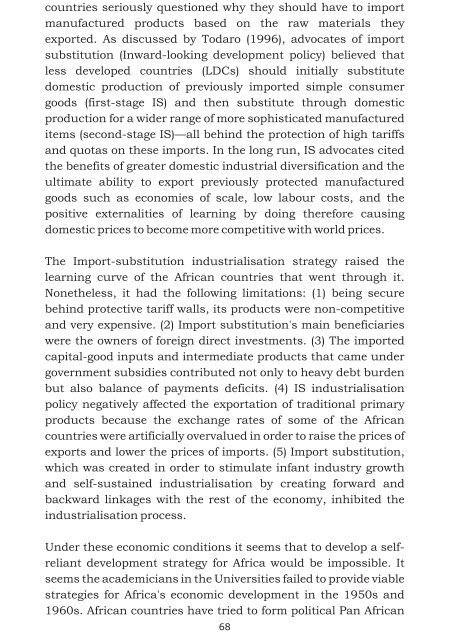Beneficiaries are actors too.pdf - Southern Institute of Peace ...
Beneficiaries are actors too.pdf - Southern Institute of Peace ...
Beneficiaries are actors too.pdf - Southern Institute of Peace ...
You also want an ePaper? Increase the reach of your titles
YUMPU automatically turns print PDFs into web optimized ePapers that Google loves.
countries seriously questioned why they should have to import<br />
manufactured products based on the raw materials they<br />
exported. As discussed by Todaro (1996), advocates <strong>of</strong> import<br />
substitution (Inward-looking development policy) believed that<br />
less developed countries (LDCs) should initially substitute<br />
domestic production <strong>of</strong> previously imported simple consumer<br />
goods (first-stage IS) and then substitute through domestic<br />
production for a wider range <strong>of</strong> more sophisticated manufactured<br />
items (second-stage IS)—all behind the protection <strong>of</strong> high tariffs<br />
and quotas on these imports. In the long run, IS advocates cited<br />
the benefits <strong>of</strong> greater domestic industrial diversification and the<br />
ultimate ability to export previously protected manufactured<br />
goods such as economies <strong>of</strong> scale, low labour costs, and the<br />
positive externalities <strong>of</strong> learning by doing therefore causing<br />
domestic prices to become more competitive with world prices.<br />
The Import-substitution industrialisation strategy raised the<br />
learning curve <strong>of</strong> the African countries that went through it.<br />
Nonetheless, it had the following limitations: (1) being secure<br />
behind protective tariff walls, its products were non-competitive<br />
and very expensive. (2) Import substitution's main beneficiaries<br />
were the owners <strong>of</strong> foreign direct investments. (3) The imported<br />
capital-good inputs and intermediate products that came under<br />
government subsidies contributed not only to heavy debt burden<br />
but also balance <strong>of</strong> payments deficits. (4) IS industrialisation<br />
policy negatively affected the exportation <strong>of</strong> traditional primary<br />
products because the exchange rates <strong>of</strong> some <strong>of</strong> the African<br />
countries were artificially overvalued in order to raise the prices <strong>of</strong><br />
exports and lower the prices <strong>of</strong> imports. (5) Import substitution,<br />
which was created in order to stimulate infant industry growth<br />
and self-sustained industrialisation by creating forward and<br />
backward linkages with the rest <strong>of</strong> the economy, inhibited the<br />
industrialisation process.<br />
Under these economic conditions it seems that to develop a selfreliant<br />
development strategy for Africa would be impossible. It<br />
seems the academicians in the Universities failed to provide viable<br />
strategies for Africa's economic development in the 1950s and<br />
1960s. African countries have tried to form political Pan African<br />
68


